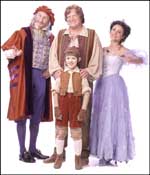
Never mind why Walt disney, of all people or conglomerates, would want to remake what the Magic Kingdom trolls did perfectly the first time. (Maybe the company hopes to cash in on our disappointment by immediately reissuing the 1940 Pinocchio on video.) Never mind why Stephen Schwartz should have embarrassed himself with some so-so tunes when the original score was a hit parade. (Just a few bars of the Oscar-winning “When You Wish Upon a Star” are enough to remind us of everything that’s missing Sunday night.) And never even mind that this otherwise misbegotten Geppetto (Sunday, May 7; 7 to 9 p.m.; ABC) is actually closer to the gloomy subtext of Carlo Collodi’s 1883 novel than Jiminy Cricket ever got. (I’ll tell you more than you want to know about Collodi in a minute, but in the book Pinocchio squashed the insect.) The real question Geppetto raises is, why Drew Carey?
I’m as amused as anyone when Carey, on his Cleveland-based sitcom, breaks into song-and-dance. But half of that amusement is the sight of an amateur imitating a professional. Professionals can’t afford to be amateurish. As the toymaking “father” of a stringless puppet – a little-boy blockhead – Carey makes a different sort of spectacle of himself. It’s not that he can’t carry a tune; it’s that he can’t carry it very far before collapsing. As the Blue Fairy with a Eurotrash accent, Julia Louis-Dreyfus is a bit better, though she gives the impression she’d rather be elsewhere and the meter’s running. As Stromboli, the puppet-napping evil magician, Brent Spiner does a passable Rex Harrison or Albert Finney, talking his way around those notes he’s likely to miss, while Rene Auberjonois, as the Professor with an espresso machine for perking perfect kidlets, has a chorus of townfolk to cover for him. Of the principals – not counting a Seth Atkins who is supposed to be wooden – only the Ringleader of Pleasure Island, who turns bad little boys into donkeys, seems entirely comfortable moving his lips and feet at the same time, but he’s played by Usher, the all-pro recording artist.
Playwright David Stern (Big, Some Enchanted Evening) wrote the script for Geppetto, with some help from Sophocles and Freud. Whereas Disney (the original animating Walt instead of the subsequent corporate fiefdom) repressed his own Oedipal issues – see Richard Schickel’s The Disney Version – to whittle down the unsocialized Pinocchio until he was frightened into good behavior, model citizenship, and a Protestant work ethic, Stern is harder on the father, who likes the idea of a boy more than he does its messy embodiment. So the Pinocchio in Geppetto is more of a runaway than a delinquent. And this chimes with what Jack Zipes tells us in Happily Ever After: Fairy Tales, Children and the Culture Industry about Carlo Collodi, the oldest of nine siblings in a Florentine family so poor that they shipped him off to relatives; a seminary student who fought for Italian independence from Austria in the little revolutions of 1848; a civil servant, satirist, and polemicist who had angry things to say about poverty and peasant children, about conformity and punishment, and who actually killed off poor Pinocchio in a magazine serial, only to bring him back after a storm of reader protest.
We won’t get into symbolic noses, from Charles Perrault and Mme. Le Prince de Beaumont to Cyrano and Gogol. But we should mention that Disney’s repressions returned in Pinocchio in time for the monster shark and the vicious whipping of the donkeys. Whereas the only thing about Geppetto that’s genuinely scary is Drew Carey.